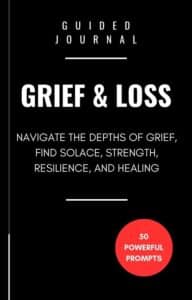In the depths of grief and loss, we find ourselves lost in the labyrinth of emotions, struggling to make sense of the chaos that engulfs our hearts. It is in these moments of deep sorrow that the power of journaling becomes a guiding light, offering solace and a path towards healing.
Journaling allows us to pour our pain onto the pages, to explore the intricate web of emotions, memories, and questions that arise during times of loss. It is a sacred space where we can navigate the labyrinth of grief, untangling the threads that bind us, and finding our way back to ourselves.
In this article, we present you with 50 profound journal prompts that will serve as beacons of hope and self-discovery on your journey through grief and loss. Each prompt is carefully crafted to invite reflection and introspection, to gently guide you through the depths of your emotions and help you make sense of the pain.
Whether you have recently experienced a loss or are still carrying the weight of a past grief, these prompts will provide you with a safe haven to express, process, and heal.
So, grab your journal and a pen, and prepare to embark on a transformative voyage. Through the power of words, you will find the strength to confront your grief, honor your loved ones, and embrace the healing that comes with self-reflection.
These prompts are not meant to be answered all at once or in any particular order. Instead, let them be your companions on this journey, guiding you towards moments of clarity, insight, and ultimately, growth.

Understanding Grief: Navigating the Journey of Loss and Healing
Dear Reader, have you ever experienced a profound sense of sadness, emptiness, or confusion after the loss of a loved one or a significant life event? If so, you may have encountered grief. Grief is a complex and natural response to loss, and understanding its intricacies can help us navigate through this challenging journey of healing.
Defining Grief: A Multifaceted Emotion
Grief can be defined as a natural response to any kind of loss, be it the death of a loved one, the end of a relationship, a career setback, or a major life transition. It encompasses a wide range of emotions, thoughts, and physical sensations that arise as we try to cope with the impact of our loss.
While grief is often associated with bereavement, it is important to recognize that grief can also arise from non-death-related losses, such as the loss of a cherished dream or a sense of identity.
The Stages of Grief: Navigating the Emotional Roller Coaster
Grief is not a linear process but rather a series of stages that individuals may experience in their unique ways. The renowned psychiatrist Elisabeth Kübler-Ross identified five stages of grief: denial, anger, bargaining, depression, and acceptance.
However, it’s important to note that these stages are not fixed or sequential. People may move through them in different orders, revisit certain stages, or even skip some altogether. Understanding these stages can help validate our emotions and provide a framework for self-reflection and growth.
Examples of Grief in Everyday Life
To better connect with the concept of grief, let’s explore some relatable examples. Consider a person who loses their job unexpectedly. Initially, they might experience denial, refusing to accept the reality of their situation. As reality sets in, anger might arise, directed at the circumstances or even the company that let them go. They might then enter a phase of bargaining, seeking ways to regain what was lost or find a new job quickly. Depression may follow, characterized by feelings of sadness, worthlessness, and a lack of motivation. Eventually, acceptance may emerge as they come to terms with their situation and begin the process of rebuilding their career and finding new opportunities.
Nurturing Yourself Through Grief: The Importance of Self-Care
While grief can be a challenging and painful experience, it also presents an opportunity for personal growth and healing. Self-care plays a crucial role during this journey, helping individuals cope with their emotions and find solace in difficult times. Engaging in activities that bring joy, seeking support from loved ones, practicing mindfulness and self-compassion, and prioritizing physical and mental well-being are all essential aspects of self-care during grief.
Understanding the concept of grief is the first step towards navigating its challenging path. By embracing the multifaceted nature of grief, acknowledging the stages we may encounter, and prioritizing self-care, we can gradually heal and find meaning in our losses. Remember, grief is a deeply personal journey, and it is okay to seek support from others along the way. May this knowledge empower you to navigate your own grief with compassion, resilience, and hope.

Harnessing the Power of Journaling: A Path to Healing and Growth
Understanding Journaling as Therapy
Journaling is more than just putting pen to paper; it is a therapeutic practice that allows you to express, reflect, and process your emotions in a safe and supportive environment. Through journaling, you create a space that is entirely your own, free from judgment or external expectations. It serves as a companion, a confidant, and a witness to your thoughts and feelings.
The Benefits of Journaling During Grief
During times of grief, it can be challenging to find the right outlet for your emotions. Journaling provides a safe and private space for you to explore your feelings, memories, and experiences. By writing about your grief, you give it a voice and allow yourself to process the pain, confusion, and sadness that accompany loss.
Journaling can also help you make sense of your emotions and gain insights into your healing journey. It allows you to track your progress, identify patterns, and recognize areas where you may need additional support or self-care. By engaging with your grief through journaling, you create the opportunity for growth and transformation.
Real-Life Examples of Journaling’s Transformative Power
To illustrate the profound impact of journaling, let’s explore some real-life examples:
- Sarah, who lost her mother, found solace in journaling. Through writing, she was able to express her deepest emotions and connect with her memories of her mother. Journaling became a cherished ritual that allowed Sarah to honor her mother’s legacy and find meaning in her grief.
- Mark, who experienced the loss of his job, turned to journaling as a way to make sense of his emotions and regain a sense of purpose. By exploring his feelings and reflecting on his strengths and aspirations, he discovered new career paths and rebuilt his confidence.
These examples demonstrate how journaling can serve as a powerful tool for healing, growth, and self-discovery during times of grief.
Incorporating Journaling into Your Daily Life
Now that you understand the therapeutic benefits of journaling, let’s explore practical tips for incorporating it into your daily life:
- Create a consistent journaling routine: Set aside a specific time each day to journal. It could be in the morning to start your day with clarity or in the evening to process your emotions before bed.
- Find a journaling method that works for you: Whether it’s traditional pen and paper, a digital journal, or even voice recordings, choose a method that resonates with you personally.
- Use prompts and exercises: If you’re unsure where to begin, prompts and exercises can provide a starting point. Consider questions like “What is one happy memory you have of your loved one?” or “How has your grief transformed you?”
- Practice self-compassion and vulnerability: Be kind to yourself during the journaling process. Allow yourself to be vulnerable and embrace the emotions that arise. Remember that there are no right or wrong answers—your journal is a judgment-free zone.
- Experiment with different techniques: Explore various journaling techniques such as gratitude journaling, stream-of-consciousness writing, or letter writing. Find the methods that resonate with you and adapt them to suit your needs.
Journaling for Personal Growth and Empowerment
Journaling is not just a tool for healing; it is also a pathway to personal growth and empowerment. By engaging with your grief through journaling, you open yourself up to new perspectives, insights, and possibilities.
Journaling can foster a positive mindset, promote emotional healing, and provide a sense of empowerment during challenging times. It allows you to take an active role in your healing journey, providing a sense of control and agency over your emotions and experiences.
You now have a comprehensive understanding of how journaling can aid in navigating grief and loss. By incorporating journaling into your daily life and exploring its transformative power, you are embarking on a journey of self-discovery, self-care, and personal growth.
Remember, your journal is a sacred space that holds your thoughts, emotions, and experiences. Embrace the power of journaling and allow it to guide you on your path to healing and growth.

Journal Writing Prompts for Grief & Loss
Write about the moment you received the news of your loss. How did your body physically respond? What were the first thoughts that crossed your mind?
Explore your feelings of anger related to your loss. Who or what are you angry at? How has this anger manifested in your daily life?
Write a letter to the person you’ve lost. What are the things you wish you could tell them, or wish you had said when they were still with you?
Describe a dream you’ve had about the person or thing you lost. How did it make you feel once you woke up?
Reflect on a cherished memory of the one you’ve lost. Why does this memory stand out? How does it make you feel?
Describe a particular day when your grief felt overwhelming. What triggered it and how did you cope with it?
Write about the first time you laughed after your loss. How did it make you feel?
Describe a place that reminds you of your lost one. How does this place make you feel when you visit it?
Reflect on the changes you have noticed in yourself since your loss. How have you grown or regressed?
Explore your feelings of guilt related to your loss. Is there anything you regret or wish you had done differently?
Write about a moment when you felt a connection with your lost one after their passing. What happened and how did it make you feel?
Describe the most difficult part of your daily routine without the one you’ve lost. How have you adjusted?
Write about the first birthday, anniversary, or special date you faced without the person you lost. How did you commemorate the day?
Reflect on your healing process. What steps have you taken towards healing? How does this make you feel?
Write about a moment when you felt completely alone in your grief. What brought on this feeling and how did you deal with it?
Describe the support you’ve received from others. Has it been helpful or overwhelming?
Reflect on the concept of ‘closure’ in relation to your grief. Do you believe in it? Why or why not?
Write about a moment when you felt guilt for feeling happy or normal after your loss. How did you reconcile with these feelings?
Describe a moment when you felt misunderstood by others in your grieving process. How did this make you feel?
Write about a song, movie, or book that reminds you of your lost one. Why does it have such a strong connection?
Reflect on a moment of unexpected joy amidst your grief. How did this moment come about?
Write about the things you wish people understood about your grief.
Describe a positive change in your life that has come as a result of your loss.
Write about an instance when you felt your grief was not respected or acknowledged. How did this make you feel?
Reflect on your fear of forgetting the person or thing you’ve lost. How does this fear manifest in your day-to-day life?
Write about a tradition you’ve started or maintained in honor of the one you’ve lost.
Describe an object that holds a significant connection with your lost one. What is its story?
Write about a moment when you realized that life goes on, despite your loss.
Reflect on a lesson you’ve learned from your grief.
Write about a moment when you felt a sense of peace in your grief.
Describe a conversation that had a profound impact on your grieving process.
Write about a moment when you felt the presence of your lost one.
Reflect on the difference between grieving and healing. How do you distinguish between the two?
Write about a moment when you allowed yourself to fully feel your grief.
Describe a moment when your grief took you by surprise.
Reflect on the physical manifestations of your grief. How has your body reacted to the loss?
Write about a fear you have related to your grief.
Describe a moment when you found strength in your grief.
Reflect on how your view of life has changed as a result of your loss.
Write about a moment when you felt a sense of acceptance towards your loss.
Describe a change in your relationships since your loss.
Reflect on how your loss has affected your sense of identity.
Write about a moment when you honored the memory of your lost one.
Reflect on the concept of time in relation to your grief. Has it been a healer, or a thief?
Describe a moment when grief felt like a heavy physical weight.
Write about a moment when someone’s comfort or words had a profound impact on your grieving process.
Reflect on your journey of grief so far. How have you navigated the different stages?
Write about a moment when you found solace in nature during your grieving process.
Reflect on a moment when you felt a strong urge to share your grief with others.
Write about a moment when you realized your grief had transformed into something else, like resilience or acceptance.
Download Printable Journal Prompts (PDF) >>
Guided Journal for Grief and Loss
50 Powerful Writing Prompts and Reflections Designed to Support Your Healing Journey

Welcome to “Guided Journal for Grief and Loss,” a powerful and transformative guided journal designed to help you navigate the complex journey of grief and loss. This journal is meticulously crafted to provide solace, understanding, and healing during the most challenging times. Whether you are coping with the loss of a loved one, a significant life change, or any form of grief, this journal will be your compassionate companion on the path to healing.
The Overwhelming Burden of Grief
Losing someone or something dear to us can shatter our world, leaving us feeling lost, overwhelmed, and utterly alone. The weight of grief can be suffocating, with emotions ranging from sadness, anger, guilt, and even confusion. The pain feels insurmountable, and it’s hard to find a way forward.
The Endless Cycle of Sorrow
As days turn into months and months into years, grief can become a perpetual cycle, causing us to question our ability to heal. The constant reminders, the unending waves of emotions, and the longing for what once was can dim the light of hope, leaving us trapped in an endless tunnel of sorrow.
Empowering Your Healing Journey
“Guided Journal for Grief and Loss” offers a compassionate and effective solution to guide you through the intricate labyrinth of grief. This meticulously curated journal provides a safe space for you to explore your emotions, memories, and thoughts, helping you find strength, resilience, and ultimately, healing.
Gentle Prompts and Reflections
Within the pages of this journal, you’ll discover a collection of gentle prompts and reflections designed to support your healing journey. These thought-provoking prompts encourage self-exploration, allowing you to process your emotions, memories, and experiences at your own pace. Through introspection and self-discovery, you’ll uncover hidden insights and find new perspectives on your grief.
As we reach the end of this guided exploration of grief and loss, we invite you to reflect on the transformational power of journaling. Through the act of writing, you have ventured into the labyrinth of your emotions, facing the darkness head-on and emerging with newfound clarity and understanding. Your words have served as a mirror, reflecting the depths of your pain, but also the resilience and strength within you.
Remember that grief is not a linear path, and healing takes time. As you continue to navigate the labyrinth, know that your journal will always be there to hold your thoughts, feelings, and memories. It will serve as a compass, guiding you towards healing and growth, even in the face of unimaginable loss.
So, dear reader, we leave you with this thought-provoking question:
How will you continue to honor your grief and embrace the transformative power of journaling?
May your words be a source of healing, a testament to the love you carry within, and a reminder that even in the depths of grief, there is always a glimmer of hope.

